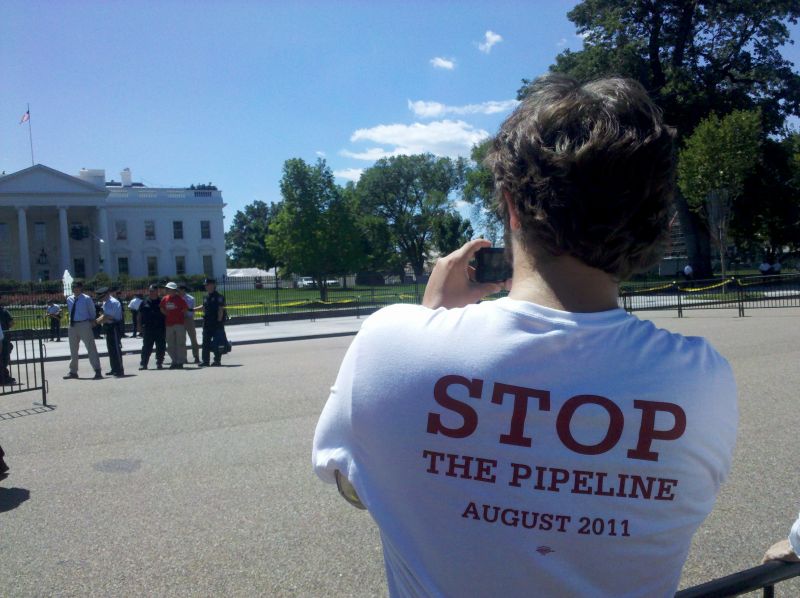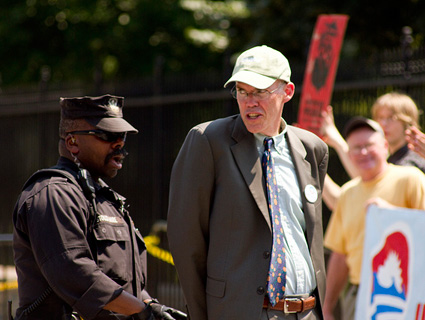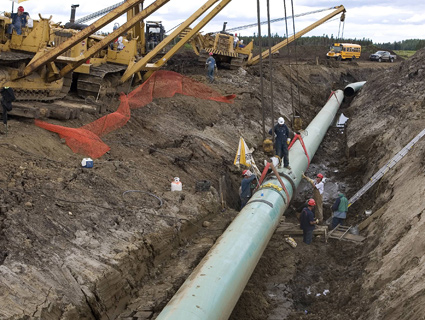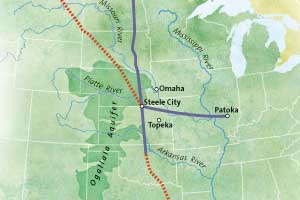Remember back two years ago when President Obama won the Nobel Peace Prize just a few months after taking office? Most people—Obama included—were like “maybe he should earn it first.” In his acceptance speech, Obama listed climate change as one of the things he would “confront,” along with other world leaders. Now a bunch of other Nobel laureates want to make sure Obama follows through on that promise—and they are calling on the president to block the Keystone XL pipeline to demonstrate his seriousness about the issue.
Nine Nobel Peace Prize winners—including Archbishop Desmond Tutu and the Dalai Lama—wrote to Obama on Wednesday asking him to reject the pipeline, which has attracted a lot of attention of late. The proposed 1,661-mile pipeline would carry oil from Canada’s tar sands to refineries in Texas. The State Department seems likely to approve the pipeline before the end of 2011, though Obama could still intercede and reject the proposal.
“Your rejection of the pipeline provides a tremendous opportunity to begin transition away from our dependence on oil, coal and gas and instead increase investments in renewable energies and energy efficiency,” they wrote. The full letter is below the fold:
Dear President Obama,
We—a group of Nobel Peace Laureates—are writing today to ask you to do the right thing for our environment and reject the proposal to build the Keystone XL, a 1700-mile pipeline that would stretch from Canada’s Alberta tar sands to the Texas Gulf Coast.
It is your decision to make.
The night you were nominated for president, you told the world that under your leadership—and working together—the rise of the oceans will begin to slow and the planet will begin to heal. You spoke of creating a clean energy economy. This is a critical moment to make good on that pledge, and make a lasting contribution to the health and well being of everyone of this planet.
In asking you to make this decision, we recognize the more than 1200 Americans who risked arrest to protest in front of the White House between August 20th and September 3rd. These brave individuals have spoken movingly about experiencing the power of nonviolence in facing authority. They represent millions of people whose lives and livelihoods will be affected by construction and operation of the pipeline in Alberta, Montana, South Dakota, Nebraska, Kansas, Oklahoma and Texas.
All along its prospective route, the pipeline endangers farms, wildlife and precious water aquifers—including the Ogallala Aquifer, the US’ main source of freshwater for America’s heartland. We are aware that Nebraska’s Governor Dave Heineman—as well as two Nebraska Senators—has urged you to reconsider the pathway of the pipeline. In his letter to you he clearly stated his concern about the threat to this crucial water source for Nebraska’s farmers and ranchers. The aquifer supplies drinking water to two million people in Nebraska and seven other states. We know that another pipeline that covers some of the same route as the proposed pipeline, and built by the same company proposing to build Keystone XL, already leaked 14 times over its first year of operation. Like you, we understand that strip-mining and drilling tar sands from under Alberta’s Boreal forests and then transporting thousands of barrels of oil a day from Canada through to Texas will not only hurt people in the US—but will also endanger the entire planet. After the oil fields of Saudi Arabia, the full development of the Alberta tar sands will create the world’s second largest potential source of global warming gases. As NASA climatologist James Hansen has said, this is “essentially game over for the climate.”
There is a better way.
Your rejection of the pipeline provides a tremendous opportunity to begin transition away from our dependence on oil, coal and gas and instead increase investments in renewable energies and energy efficiency.
We urge you to say ‘no’ to the plan proposed by the Canadian-based company TransCanada to build the Keystone XL, and to turn your attention back to supporting renewable sources of energy and clean transportation solutions. This will be your legacy to Americans and the global community: energy that sustains the lives and livelihoods of future generations.
Sincerely,
Mairead Maguire, Nobel Peace Laureate (1976) – Ireland
Betty Williams, Nobel Peace Laureate (1976) – Ireland
Adolfo Pérez Esquivel, Nobel Peace Laureate (1980) – Argentina
Archbishop Desmond Tutu, Nobel Peace Laureate (1984) – South Africa
His Holiness the 14th Dalai Lama, Nobel Peace Laureate (1989) – Tibet
Rigoberta Menchú Tum, Nobel Peace Laureate (1992) – Guatemala
José Ramos-Horta, Nobel Peace Laureate (1996) – East Timor
Jody Williams, Nobel Peace Laureate (1997) – USA
Shirin Ebadi, Nobel Peace Laureate (2003) – Iran
















